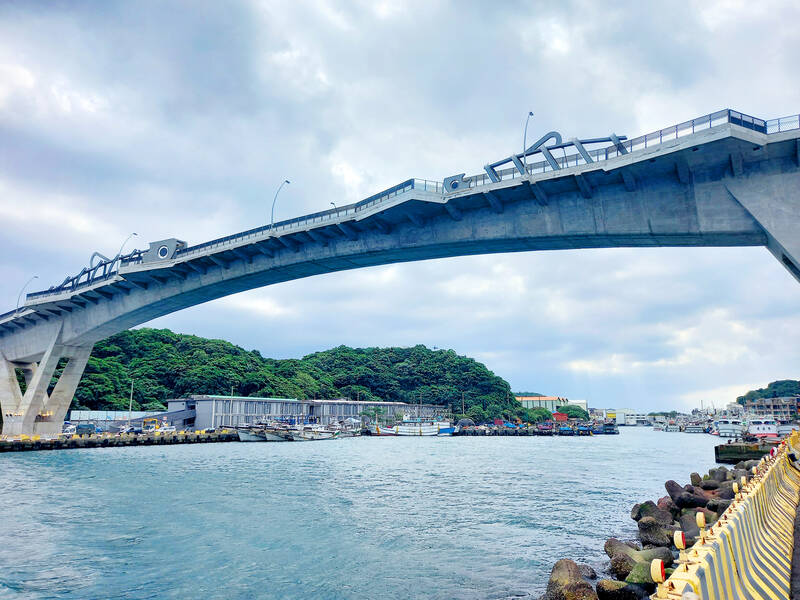The rebuilt Nanfangao Bridge in Yilan County’s Suao Township (蘇澳) opened to traffic yesterday, with President Tsai Ing-wen (蔡英文) telling a ceremony that she hopes the new bridge creates opportunities to revive the fishing town.
The original bridge collapsed on Oct. 1, 2019, killing six workers from the Philippines and Indonesia who were on fishing vessels that were crushed by the falling structure.
Nine other Philippine and Indonesian workers, one person who was driving a tanker truck on the bridge when it collapsed and three rescue personnel were injured in the incident.

Photo: Chiang Chih-hsiung, Taipei Times
Tsai said the bridge’s collapse caused significant casualties and had a major impact on the local economy, tourism and traffic.
She thanked Premier Su Tseng-chang’s (蘇貞昌) Cabinet for its contributions to efforts to rebuild the bridge.
The project faced numerous challenges, including dismantling the old bridge and designing the new one, as well as building the structure during the COVID-19 pandemic, which hampered progress, Tsai said.
Construction of the 796.53m Nanfangao Bridge began on July 16, 2020. It cost NT$860 million (US$28 million at the current exchange rate).
The bridge’s opening had to be pushed back by three months from Sept. 18 after a problem occurred on May 27 involving the pouring of concrete, Minister of Transportation and Communications Wang Kwo-tsai (王國材) said on July 11.
Tsai said the bridge is expected to boost the local economy and tourism while improving traffic flow at the Nanfangao Fishing Port (南方澳漁港).
She also said the bridge’s unique mackerel shape would make it an important landmark that signals to fishers that they have arrived home when they return to Nanfangao.
Su said the government has conducted safety checks on 26,000 bridges across Taiwan, with 101 determined to be in need of repair or reinforcement.
So far, 100 of the bridges have been repaired or reinforced, with the work on the last one scheduled to be completed in April next year, he said.

Chinese spouse and influencer Guan Guan’s (關關) residency permit has been revoked for repeatedly posting pro-China videos that threaten national security, the National Immigration Agency confirmed today. Guan Guan has said many controversial statements in her videos posted to Douyin (抖音), including “the red flag will soon be painted all over Taiwan” and “Taiwan is an inseparable part of China,” and expressing hope for expedited reunification. The agency last year received multiple reports alleging that Guan Guan had advocated for armed reunification. After verifying the reports, the agency last month issued a notice requiring her to appear and explain her actions. Guan

GIVE AND TAKE: Blood demand continues to rise each year, while fewer young donors are available due to the nation’s falling birthrate, a doctor said Blood donors can redeem points earned from donations to obtain limited edition Formosan black bear travel mugs, the Kaohsiung Blood Center said yesterday, as it announced a goal of stocking 20,000 units of blood prior to the Lunar New Year. The last month of the lunar year is National Blood Donation Month, when local centers seek to stockpile blood for use during the Lunar New Year holiday. The blood demand in southern Taiwan — including Tainan and Kaohsiung, as well as Chiayi, Pingtung, Penghu and Taitung counties — is about 2,000 units per day, the center said. The donation campaign aims to boost

The Kaohsiung Tourism Bureau audited six hotels in an effort to prevent price gouging ahead of Korean band BTS’ concert tour in the city scheduled for Nov. 19, 21 and 22 this year. The bureau on Friday said that the audits — conducted in response to allegations of unfair pricing posted on social media — found no wrongdoing. These establishments included the local branches of Chateau de Chine, Hotel Nikko, My Humble House, and Grand Hai Lai, it said, adding that the Consumer Protection Commission would have penalized price gougers had the accusations been substantiated. The bureau said the Tourism Development Act

BACK TO WINTER: A strong continental cold air mass would move south on Tuesday next week, bringing colder temperatures to northern and central Taiwan A tropical depression east of the Philippines could soon be upgraded to be the first tropical storm of this year, the Central Weather Administration (CWA) said yesterday, adding that the next cold air mass is forecast to arrive on Monday next week. CWA forecaster Cheng Jie-ren (鄭傑仁) said the first tropical depression of this year is over waters east of the Philippines, about 1,867km southeast of Oluanpi (鵝鑾鼻), and could strengthen into Tropical Storm Nokaen by early today. The system is moving slowly from northwest to north, and is expected to remain east of the Philippines with little chance of affecting Taiwan,